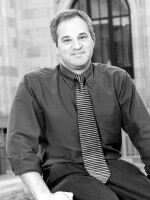MELISSA BLOCK, host:
From NPR News, this is ALL THINGS CONSIDERED. I'm Melissa Block.
ROBERT SIEGEL, host:
And I'm Robert Siegel.
With the damage from Hurricane Katrina as a backdrop, John Edwards kicked off his 2008 presidential campaign today. The former senator and Democratic vice-presidential candidate made his announcement in New Orleans using the aftermath of the disaster to try to drive home his populous platform.
Melissa spoke with Senator Edwards today. We'll hear that interview in a few minutes. We begin with NPR's Adam Hochberg, who has this report from New Orleans.
ADAM HOCHBERG: Edwards announcement set against the backdrop of the city's Upper 9th Ward marked the official start of his 2008 campaign. But the former senator has been in unofficial campaign mode for nearly two years. Indeed, only three months after he and John Kerry lost the 2004 election, Edwards already was visiting the early primary state of New Hampshire. By spring 2005, he was in Ohio. So today's announcement came as little surprise.
Mr. JOHN EDWARDS (2008 Presidential Candidate): I'm here in New Orleans to announce that I'm a candidate for the presidency of the United States in the election in 2008. This campaign will be a grassroots campaign where we ask people to take action.
HOCHBERG: John Edwards stood beside a storm damaged house that remains in ruins, an image he used to highlight his campaign theme. Repeating a phrase he used in 2004, he bemoaned what he calls the two Americas that he says leaves people trapped in poverty. And as he praised a group of volunteers who have been repairing homes here, Edwards called on Americans to embrace community service.
Mr. EDWARDS: You walk around in these neighborhoods, and what you'll hear is the good that's been done in New Orleans has been done by faith-based groups, charitable groups and volunteers. That's what America needs to do again.
HOCHBERG: Since his days as a Southern senator, Edwards has drifted left. He now speaks out against global warming, advocates universal healthcare and expresses regret over a Senate vote authorizing the Iraq war. Today, he said success in Iraq will require a political, not a military solution. And he called for the U.S. to withdraw 40,000 to 50,000 troops.
Mr. EDWARDS: We need to make it clear that we intend to leave Iraq and turn over the responsibility of Iraq to the Iraqi people. The best way to make that clear is that we actually start leaving.
HOCHBERG: Edwards was a wealthy trial lawyer before he entered politics. But today, he looked the part of neither attorney nor politician. He made his announcement wearing blue jeans and an open collar shirt. And as an ex-senator, who left office after just one six-year term, he tried to play his short political career to his advantage. In an interview after his announcement, Edwards reveled in his current role as a congressional outsider.
Mr. EDWARDS: Instead of being tangled up in a lot of the squabbling that's going on in Washington, I've been out doing stuff. I mean, it just teaches you, how it's so important to galvanize people around taking action.
(Soundbite of a gathering)
HOCHBERG: Yesterday, on the eve of his announcement, Edwards staged a photo-op outside a house that's now being renovated. TV cameras rolled as he shoveled dirt with mud on his hands and sweat on his brow, portraying a youthful image at age 53 that analysts cite we're likely to see more of.
Tom Langston, who chairs Tulane University's Political Science Department, says that image plays into Edwards' strengths.
Mr. TOM LANGSTON (Tulane University): He can't run on his experience. So he is a mister - two Americas becoming one, get everybody dreaming big dreams again, and this is John Edwards's persona.
HOCHBERG: Langston questions how well that persona will serve Edwards, especially if celebrity candidates like Hillary Clinton and Barack Obama enter the race. For now, Edwards hopes his campaign's aggressive and early start will help him build momentum. He'll make appearances in five states in the next three days.
Adam Hochberg, NPR News, New Orleans. Transcript provided by NPR, Copyright NPR.






